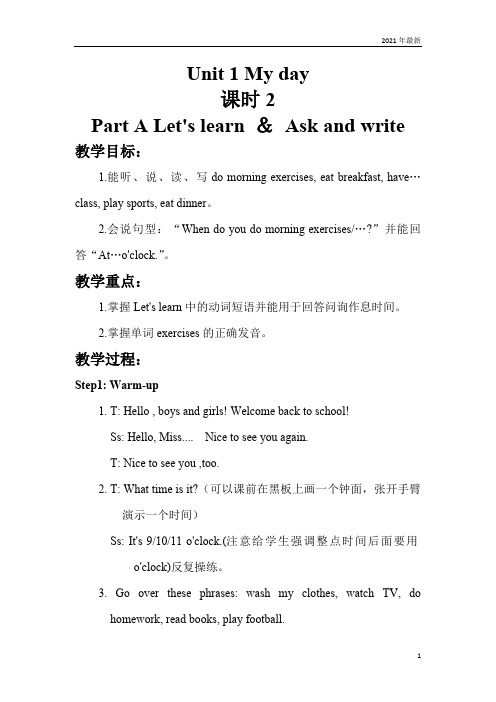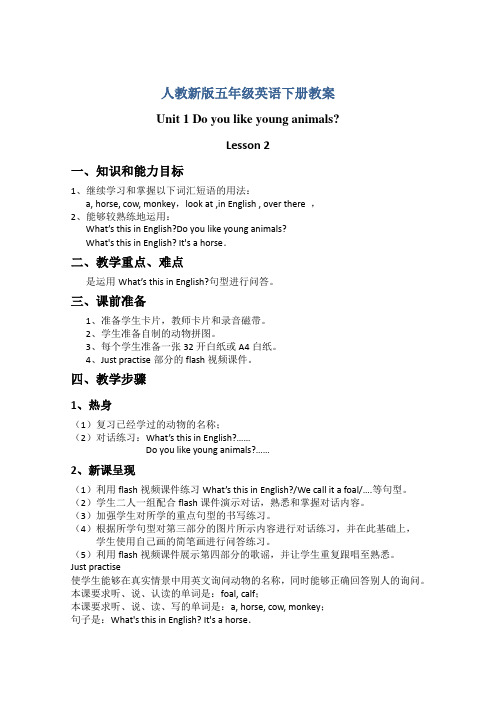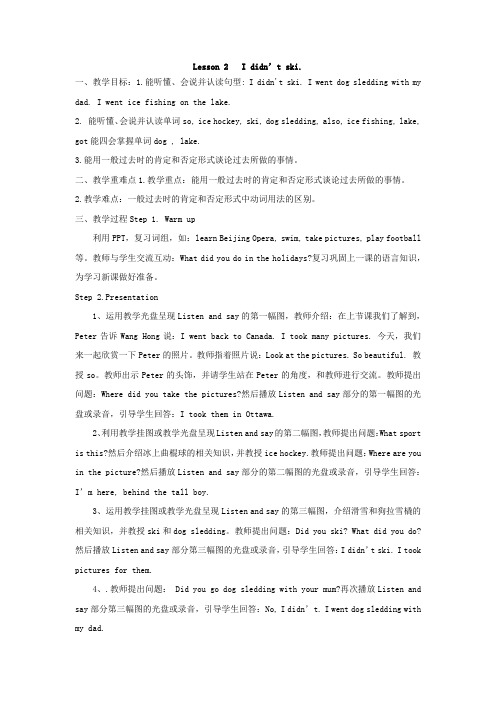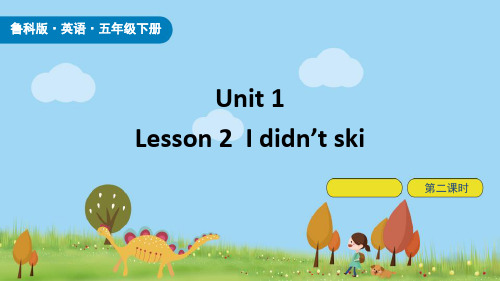五年级下册英语教案-Unit 1 Lesson 2 I didn’t ski. 鲁科版
pep版英语五年级下册Unit 1课时2教案教学设计

Unit 1 My day课时2Part A Let's learn &Ask and write 教学目标:1.能听、说、读、写do morning exercises, eat breakfast, have…class, play sports, eat dinner。
2.会说句型:“When do you do morning exercises/…?”并能回答“At…o'clock.”。
教学重点:1.掌握Let's learn中的动词短语并能用于回答问询作息时间。
2.掌握单词exercises的正确发音。
教学过程:Step1:Warm-up1. T: Hello , boys and girls! Welcome back to school!Ss: Hello, Miss.... Nice to see you again.T: Nice to see you ,too.2. T: What time is it?(可以课前在黑板上画一个钟面,张开手臂演示一个时间)Ss: It's 9/10/11 o'clock.(注意给学生强调整点时间后面要用o'clock)反复操练。
3. Go over these phrases: wash my clothes, watch TV, dohomework, read books, play football.Let's do homework/read books/play football/… .I often wash my clothes/watch TV/do homework/ read books/… . Step 2: Presentation1. Use the cards to learn new phrases.T: do morning exercises, do morning exercises, follow me to read.用同样的方式教读其他词组:eat breakfast, have…class, playsports, eat dinner(重点强调exercises、breakfast的发音)。
(人教新版)五年级英语下册教案Unit1Lesson2

人教新版五年级英语下册教案Unit 1 Do you like young animals?Lesson 2一、知识和能力目标1、继续学习和掌握以下词汇短语的用法:a, horse, cow, monkey,look at ,in English , over there ,2、能够较熟练地运用:What’s this in English?Do you like young animals?What's this in English? It's a horse.二、教学重点、难点是运用What’s this in English?句型进行问答。
三、课前准备1、准备学生卡片,教师卡片和录音磁带。
2、学生准备自制的动物拼图。
3、每个学生准备一张32开白纸或A4白纸。
4、Just practise部分的flash视频课件。
四、教学步骤1、热身(1)复习已经学过的动物的名称;(2)对话练习:What’s this in English?……Do you like young animals?……2、新课呈现(1)利用flash视频课件练习What’s this in English?/We call it a foal/….等句型。
(2)学生二人一组配合flash课件演示对话,熟悉和掌握对话内容。
(3)加强学生对所学的重点句型的书写练习。
(4)根据所学句型对第三部分的图片所示内容进行对话练习,并在此基础上,学生使用自己画的简笔画进行问答练习。
(5)利用flash视频课件展示第四部分的歌谣,并让学生重复跟唱至熟悉。
Just practise使学生能够在真实情景中用英文询问动物的名称,同时能够正确回答别人的询问。
本课要求听、说、认读的单词是:foal, calf;本课要求听、说、读、写的单词是:a, horse, cow, monkey;句子是:What's this in English? It's a horse.Just write本部分内容是学习和练习正确书写四会单词:a, horse, cow, monkey和四会句子:What's this in English? It's a horse.Let's play本部分的活动,要求学生利用自制的拼图进行语言信息交流活动。
鲁科版小学五年级英语上册《Unit1Winter Holidays Lesson 2 I didn ’t t ski》课件

I
. I had a wonderful holiday.
and
In my group, S1 didn’t go fishing, He\She went shopping. S2…
I hope you can take an active part in all kinds of meaningful activities in order to broaden your horizons. 希望大家都积极参加各种 有意义的活动,以此来开阔 自己的视野。
1.Must to do: Listen and imitate our text.
2.Choose to do: Make a survey about your friends’ activities in the winter holiday.
Wang Li Wang Li
visit my watch grandparents films
Activity 1
Activity 2
1. Finish your card.
2. Talk about it in your group.
3. Stick(贴) your card on the poster. 4. Show it.
What didn’t you do?
○ set off fireworks ○ eat jiaozi ○ go skiing ○ watch films ○ get lucky money ○ travel ○ play ice hockey ○ others(其他)__________________
go ice fishing
go skating
go skiing
鲁科版英语五年级下册unit1 Lesson 2 I didn’t ski.教案

Lesson 2 I didn’t ski.一、教学目标:1.能听懂、会说并认读句型: I didn't ski. I went dog sledding with my dad. I went ice fishing on the lake.2. 能听懂、会说并认读单词so, ice hockey, ski, dog sledding, also, ice fishing, lake, got能四会掌握单词dog , lake.3.能用一般过去时的肯定和否定形式谈论过去所做的事情。
二、教学重难点1.教学重点:能用一般过去时的肯定和否定形式谈论过去所做的事情。
2.教学难点:一般过去时的肯定和否定形式中动词用法的区别。
三、教学过程Step 1. Warm up利用PPT,复习词组,如:learn Beijing Opera, swim, take pictures, play football 等。
教师与学生交流互动:What did you do in the holidays?复习巩固上一课的语言知识,为学习新课做好准备。
Step 2.Presentation1、运用教学光盘呈现Listen and say的第一幅图,教师介绍:在上节课我们了解到,Peter告诉Wang Hong说:I went back to Canada. I took many pictures. 今天,我们来一起欣赏一下Peter的照片。
教师指着照片说:Look at the pictures. So beautiful. 教授so。
教师出示Peter的头饰,并请学生站在Peter的角度,和教师进行交流。
教师提出问题:Where did you take the pictures?然后播放Listen and say部分的第一幅图的光盘或录音,引导学生回答:I took them in Ottawa.2、利用教学挂图或教学光盘呈现Listen and say的第二幅图,教师提出问题:What sport is this?然后介绍冰上曲棍球的相关知识,并教授ice hockey.教师提出问题:Where are you in the picture?然后播放Listen and say部分的第二幅图的光盘或录音,引导学生回答:I’m here, behind the tall boy.3、运用教学挂图或教学光盘呈现Listen and say的第三幅图,介绍滑雪和狗拉雪橇的相关知识,并教授ski和dog sledding。
五年级下册英语教案-Unit1Lesson2Ididn’tski.鲁科版

五年级下册英语教案-Unit1Lesson2Ididn’tski.鲁科版Unit 1 Winter holidaysLesson 2【教学目标】1.Students can listen and repeat the new words like: ice hockey, ski, go dog sledding, go ice fishing, in Ottawa. New phrases: I didn't ski. I went dog sledding. I played it with my friends.2.Students can listen and repeat the sentences:Where did you take them? I didn't ski. I didn't go ice fishing.I got a fish. I went dog sledding. 【教学重点】1.How to use the past tense.2.They can speak the expressions correctly.【教学难点】Students speak freely the sentences:1.I didn't ski. I didn't go ice fishing. I got a fish. I went dog sledding.2.Where did you take them?【教学准备】Pictures, CD【教学过程】Ⅰ.Warm upRevise the words learn Beijing Opera, swim, take pictures, practice the dialogue with the words.A: What did you do in your holidays?B: I…Ⅱ.PresentationNow boys and girls in the winter holidays, I didn't learned Beijing Opera. I didn't go to Hainan.I didn't play football. But I went to Harbin. Show them the pictures.1.T: I went ice fishing, went dog sledding, and played ice hockey.Ice hockeyIce fishingSkiDog sleddingThen learn the new words: ice fishing, dog sledding, ice hockey, ski. Help the students say like: Ss: I went ice fishing.2.Look at Peter, What did he do in the holidays? Where did he take the pictures?3.Watch the CD, learn Listen and sayⅢ.Practice1.Read the dialogue after CD, find out the new words, go ice fishing, go dog sledding, play ice hockey, ski. Students repeat like:S: I went ice fishing.I didn't go dog sledding.2.Watch the pictures on Let's talk, practice like:S1: I went ice fishing in the holidays.S2: I didn't go ice fishing.But I went skating.3.Look at Let's do, using the table, make a dialogue with their own life.A: Did you visit your friends?B: Yes, I did./ No, I didn't.Ⅳ.Production1.Show some pictures, get the students to make some dialogues.T: I went ice fishing in the holidays.S: I didn't go ice fishing.But I went skating.2.Let's do.Get the students to make a table about their winter holidays. or their photos about winter trip. Talk like:A: Did you visit your friends?B: Yes, I did. / No, I didn't.【作业布置】1.Copy the new words: ice hockey, ski, go dog sledding, go ice fishing, in Ottawa. New phrases: I didn't ski. I went dog sledding. I played it with my friends.2.Read, listen and say the dialogue after school.。
鲁科版五年级英语下册《I didn't ski》 PPT课件(第2课时)

Presentation
点击画面 播放视频
Let’s talk
朗读对话
I did some reading
in the holidays.
I went skating in the holidays. I didn’t do reading .
I didn’t go skating .
ቤተ መጻሕፍቲ ባይዱ
I played ice hockey.
Homework
1. 抄写单词和句型。 2. 背诵单词和朗读课文。 3. 询问你的朋友们假期做的事情。
I went dogsledding.
Let’s do
Tim Tom Wang Hong
Tim
Tom Wang Hong
Did you go skating? No, I didn’t.
Did you play football?
Yes, I did.
做汇报
In the holidays, Tim played football. He didn’t go skating.
鲁科版·英语·五年级下册
Unit 1 Lesson 2 I didn’t ski
第二课时
Review
第二课时
go skating/skiing 滑雪/滑冰
play ice hockey
进行冰壶 运动
visit my friends take many pictures/photos
看望我 的朋友
拍许多 照片
— Yes, I did.
A. Does
B. Do
C. Did
D. Doing
同义句转换。 1. I had fun in Ottawa.
五年级下英语教案-Unit 1 Lesson 2 Jenny's house 冀教版(一起)
Unit 1 Li Ming Goes to CanadaT: OK, you are very clever.What can you see in the living room?S1: I can see TV, sofa and lamp… (Teacher writes the words under "living room".)T: Let's look at the third room. In the third room, you can make breakfast, lunch or supper. You can eat food, too. What's the name of it in Chinese?S:厨房.T: Yes, you are right. How to say it in English?Listen. Kitchen.Kitchen, say it please.S: Kitchen.T: Ok, we have known three rooms. Let's look at the last room. In the last room, We can take a shower and brush our teeth there. Who can tell me the name of this room? You can say it in Chinese.S:浴室.T: Ok, you are great. In English, we can say it bathroom.Listen, bathroom.Speak: bathroom.T: Look at these new words, (write "classroom") what can you find?S1: Bedroom, bathroom, living room后面都有room.T: You are a careful boy. Can you guess what the meaning of "room" is?S2:室,房间.T: Ok, Let's look at Jenny's house. Turn to page four.Step 2 Read the text.T: Do you want to know Jenny'shouse?S: Ok.4.播放优秀课件: Lesson 2,学生观看课件.T: Do you know Jenny's house?S: Yes.T: Ok. Let's read the text again.5.Introduce "mine, yours"T: In our book, there are two new words. "mine and yours".Teacher takes another student's book and says and writes down on the blackboard: "This is my book. That is yours. That is your pencil. That is yours."This is my coat. This is mine.T: Do you know the meaning?S: Yes. mine是我的,yours是你的.T: Yes, you are right.教师板书:yours =your bookTo learn the new text in a lively way.To know the use of mine and yours.mine = my coatyours = my pencilTo make students say sentences freely, the teacher should hold some objects in his/ her hands or point to the objects and make the others clear about their meaning.e.g.:T: (Points to a book) This is mine.S: This is my book.6.T: Ok, Let's see what's in the bedroom?播放课件.Ask some students to introduce what is in their bedroom.7.Play a game.教师把学生分成四组,把含有bathroom, kitchen, bedrooms, living room的图片分别分给这四组同学,一名扮演屋子的主人,一名扮演来宾.坐主人的扮演者给来宾介绍自己的家.8.播放课件: Where are they?再一次重现本课所学的重点单词.9. Finish let’s do it!To make students know what we usually put in our living room.To make students know the words in a lively way, the game will help students remember clearly.。
五年级英语下册 Unit 1(2)教案 新世纪版
Unit 1 What do you want to be in the future?一、教育目标:1.教育学生从小树立远大的理想,并为之付出自己应有的努力。
2.教育学生要立长志,不要常立志。
二、知识目标:(一)基础目标:1.学习本单元单词:start, future, vacation, IT, enough, artist, enjoy, astronaut.2.掌握一般将来时的句型结构及其功能。
3.听说和阅读理解Grand Theatre 中的语言材料,并能根据主话题写6~8句话。
4.掌握元音音标 /i:/, /I/。
5.朗读Rhyme,语音、语调、节奏基本正确。
(二)发展目标:1.能用英语来表达自己的理想,并说明原因。
2.能根据实际情况写一份关于自己理想的小短文,并在小组或班级里交流。
三、能力目标:学生能用各种语言形式表达自己、同学、朋友或父母的愿望。
(综合性能力,口头、笔头、阅读理解有关伟人成材的故事,并要为实现自己的理想而努力。
)四、情感、策略和文化等目标:1.情感态度:学会关心父母或他人。
2.学习策略:培养学生合作学习、共同完成任务的团队协作精神。
3.文化目标:了解西方国家伟人成材的经历。
五、教学资源:Student’s Book 5B P1~P7, cassette 5A Unit 1, Student’s Work Book 5B P1~P9, Pictures of signs, Teaching transparencies.六、教学时间:七课时。
(其中5课时新授,2课时练习和复习,练习册随教学进度完成。
)Lesson Plan (1): WonderlandI. Pre-task preparation:1. Say hello to the class, ask the students to talk about their winter holidays.Offer some help if they need.2. Sing a song or li sten to a story about the Chinese New Year’s Day (Spring Festival). Talk about what people do during the Spring Festival. e.g. Chinese New Year is the biggest holiday celebrated among Chinese people. What do people often do during the Spring Festival? (get together on New Year’s Eve, eat dumplings, set off firecrackers, give lucky money/get lucky money, visit relatives and friends etc.)II. While-task procedure:1. Learn the new words (vacation, future, artist, astronaut, future) while talking about the Chinese New Year. Review the words about other occupations.T: On the New Year’s Eve, people don’t go to bed until 12 o’clock, they always make a wish. I made a wish on the Chinese New Year’s Day when I was 14 years old. I wanted to be an English teacher. It came true 15 years later. What’s your wish? What do you want to be in the future? (Try to tell the reason. e.g. I want to be an artist because I like drawing. I enjoy drawing. Xu Beihong is a great artist. He was good at drawing horses. Beethoven was a great composer.)2. Learn some other new words by talking about the new semester.T: Today is the first day of school. The winter vacation is over. We are back to school again. Our morning classes begin at 7:50. We can also say, “we begin our mornin g classes at 7:50.” Do you enjoy your school life here? Have you got enough time to do your homework? (Explain the meaning of the word ‘enough’)3. Write the phonetic symbols of the new words on the board. Ask the students to read them out.4. Play the cassette: Wonderland. Students listen and follow with their books open.5. Play the cassette again. Students listen and repeat.6. Let the students ask questions about the new words.7. Read the new words and sentences in groups of four. Pay attention to the pronunciation. Try to remember the meanings of the new words.III. Post-task activities:1. Ask the students to remember the new words in two minutes.2. Listen and fill in the blanks.en__ __gh __ __tist enj__ __ f__turest__ __t v__c__tion astr__n__ __tFirst students fill in the blanks individually. Then check the answers together.3. Divide the students into groups of four. Ask them to make sentences with the new words.4. Invite individuals to say the sentences they have made.5. Page3, Student’s Work Book . Listen and fill in the blanks.Lesson Plan (2): FarmlandI. Pre-task preparation:1. Encourage the students to say something about their future. Prompt the less able students by asking them some questions about their future.2. Show some pictures to the students. Review the future tense by asking and answering the questions about the pictures: What will they do this evening?3. Ask the students to think of the things they will do. Learn how to use ‘shall’ and ‘will’ in the future tense.II. While-task procedure:1. Show the pictures of Farmland. Make dialogues with the students. Learn the new phrases: wash up, join them.2. Ask: Do you like English? Are you good at English? How do you learn English? Shall we do some listening and reading in English? Shall we do more listening and reading? Where will you go after this summer vacation? etc.3. Play the cassette: Mini dialogue. Students listen and follow .4. Play the cassette again. Students listen and repeat.5. Ask the students to read the dialogue.6. Encourage the students to make dialogues with their own words.7. Ask the students to look at the pictures and ask and answer the questions in pairs.8. Divide the students into groups. Encourage them to talk about what they will do during the summer vacation.III. Post-task activities:1. Distribute a sheet of paper to each group. Ask the students to write down the things they want to do.2. Guess what their friends will do. e.g. What will you/they/he/she/we/Linda do? Will you/they/he/she/we/Linda go to the cinema?3. Try to find the mistakes and correct them. Give some help if they need.4. Ask the students to practice acting the mini dialogue in pairs.5. Invite some pairs of students to act in front of the class. Encourage more able students to use their own words.6. Page 5,Student’s Work Book .a. Students work in pairs to complete the sentences orally.b. Invite individual student to read the sentences.c. Students write the missing words individually.Lesson Plan (3): Grand TheatreI Pre-task preparation:1. Sing a song.2. Say ‘Happy New Year’ to the students. Ask: Did you have a nice Spring Festival? What did you do during the Spring Festival? How was your Spring Festival?3. Review the occupations by talking about their future. T: On the night of Spring Festival, I made a wish when I was 14 years old. I wanted to be an English teacher. Now my dream came true. What are you going to be in the future?II. While-task procedure:1. Yang Mingming, Tom and Norman also have dreams. Let’s rea d the text in groups. It will tell you.2. Play the cassette. Students listen and repeat .3. Find the phrases which has the similar meanings of the phrases given: at the beginning of at the start of summer holidays summer vacationread and listen to more English do more listening and readinglikedrawing enjo y drawingget me a teacher/ask a teacher to teach me find me a teacher sometimes…sometimes…sometimes…one day…the next day…the next day4. Read the phrases on the board.5. Fill in the blanks:__________ the new term, the students are __________ about their future. After __________ they will go to middle school.I am Yang Mingming. I want to be an IT engineer. But my English is not __________. So I’ll ____________ every day. Tom will ________ me ________ my English.I am Tom. I want to be an artist. I __________ very much. My parents will __________. I am very happy __________ that.I am Norman. What do I want to be? __________ I want to be a football player. __________ I want to be an astronaut. __________ I want to be a pop singer. But my parents just want me to get up in time for school every day.What do you want to be in the future?6. Ask and answer: 1) What are the students doing in the classroom?2) What does Yang Mingming want to be in the future?3) Who wants to be an artist?4) And what about Norman?7. Read Q and A together.III. Post-task activities:1. Yang Mingming, Tom and Norman have resolutions. Many other persons also have resolutions. Let’s guess what they want to do.e.g. 1) Bill Gates A. to make more moneyB. to enjoy lifeC. to set up a new IT companyD. to be the president of USA2) Liu Xiang A. to break the world recordB. to release his first CDC. to marry a beautiful girlD. to be the final champion of the Golden League(黄金联赛总冠军).Students guess the dreams of the famous person and tell the reason. For example, may be Bill Gates wants to be the president of USA. Because he has lots of money. He is very famous.I think he can take part in the vote and maybe he will be successful.Read and find the answer:Bill Gates is the greatest IT engineer in the world. He set up the large IT company of Microsoft. He is one of the richest man in the world. His resolution is to spend more time to enjoy life.2. What do people want to do after the tsunami(海啸)?3. Different people have different resolutions. Wh at’s your resolutions in the future? Please write down on the paper.4. Talk about their own future.5. Guess what will the teacher want to do in the future?Lesson Plan (4): DisneylandI. Pre-task preparation:1. Ask and answer some questions about the text. Make the wishes and tell the reasons.2. Ask the students to practice acting a story similar to the one in Grand Theatre.3. Students listen to the rhyme and repeat.II. While-task procedure:1. Play the cassette: Pair work on Page 6. Students listen and follow in their books.2. Play the cassette again. Students listen and repeat.3. Give pairs of students a few minutes to practice the dialogue.4. Divide students into groups. Ask them to practice acting the dialogue.5. Invite groups to act the dialogue in front of the class.6. Students listen and fill in the blanks: (Words on page 7 in Music Box) Learn the phonetics according to the sound they have heard.7. Write the phonetics on the board. Ask individuals to read them.8. Play the cassette: Rhyme. Students listen and follow in their books.9. Play the cassette again. Students listen and repeat.10. Invite individual students to read the rhyme.11. Have the students understand the Chinese meaning of the rhyme.III. Post-task activities:1. Student’s Work Book Page 1,2.a. Play the cassette. Students listen and choose the right answer.b. Students finish the exercises individually.c. Ask the students to read the sentences with the tape and check the answers.2. Student’s Work Book Page 4.a. Students listen and answer.b. Invite individual student to answer the questions.c. Invite individual student to write the answers on the board. The rest of the class check the answers.d. Ask the whole class read the questions and answers together.。
五年级下册英语教案-Module 1 Unit 2 She didn’t have a televi
五年级下册英语教案-Module 1 Unit 2 She didn’t have atelevision本教案适用于五年级下册英语课程的Module 1 Unit 2。
本单元的重点是介绍过去的生活方式和过去的科技。
教学目标1.学生能够说出过去的生活方式和过去的科技。
2.学生能够运用过去式形式讲述过去的生活方式和科技。
教学重点过去式的使用和谈论过去的科技。
教学难点谈论过去的生活方式对学生的词汇量和语法知识的考验。
教学准备1.教材《外研社(三起)》五年级下册英语教材以及附加资料。
2.白板和相应的笔。
3.学生用书和笔。
4.录音机器。
教学过程第一步:引导学生回忆过去的生活方式1.老师向学生询问过去人们的生活方式有哪些区别于现在。
2.引导学生谈论过去的饮食、交通、娱乐等方面的变化。
第二步:让学生听听录音1.给学生播放一段录音,让他们根据录音填写表格。
表格中包括录音中提到的几个过去时的动词、人名和年代等信息。
2.让学生听录音的目的是帮助他们通过实践掌握过去时的用法并扩展他们的听力技能。
第三步:学生自主学习和小组讨论1.让学生分成小组(3至5人),并要求他们阅读课本附带的生词和短语。
2.让学生在小组内交流,回顾上一节课的内容并讨论它们在现代生活中的意义。
第四步:根据本节课的故事总结规律1.让学生听故事|Mac the bookworm2.根据故事的内容,教授学生讲述过去压缩碟和书籍的使用情况。
第五步:总结和巩固1.借助过去式的话题,使用学术语言概括过去式的用法。
2.让学生回顾自己学到的知识,确认他们掌握了过去式的使用。
第六步:作业1.学生可以用过去式完成一份小型作文,记录自己的一件过去的事情。
2.学生可以选择收集一些过去的事实并将它们列成表格。
个人建议本单元的教学注意引导学生探究历史上的科技和生活方式,即便学生在这方面的了解很少。
使用实际场景来激发学生的好奇心和主动学习精神,并为他们今后的学习起到扎实的基础。
冀教版2019-2020年五年级英语下册 Unit 1 Lesson 2 教案(1)
What Are Y ou Doing?一、设计思想《英语课程标准》中明确指出,义务教育阶段英语课程的总目标是:通过英语学习是学生形成初步的综合语言运用能力。
学生通过英语课程掌握基本的英语语言知识,发展基本的英语听、说、读、写技能,初步形成用英语与他人交流的能力。
二、学情分析:五年级学生已经具备了一些用英语交流的基本能力,对一些简单的动词、名词等词性单词也具备了简单的辨别和理解以及运用的能力,并且能简单描述一些图片中所发生的事情。
三、教学目标分析知识与技能:①能够听、说、读、写以下词汇: see, draw a picture , look out of the window.②在教师的帮助下掌握和运用现在进行时态,能借助图片,动作描述事情,并能进行问答描述等。
情感态度:在小组活动中积极参与课堂学习活动,能与其他同学积极配合和合作,敢于开口。
学习策略:在多样性的活动(同桌练习,学生表演)中,积极与他人合作,共同完成学习任务,并能够积极运用所学英语进行表达和交流。
文化意识:了解人际交往习俗,懂得在公共场所不能大声喧哗、唱歌、指点他人等。
四、教学重点、难点1)教学重点:在具体的情境中正确运用现在进行时态表达动作。
2)教学难点:能够掌握完整的现在进行时的句子结构:五、教学过程设计StepⅠ Class opening and review(3 minutes)1.问候2.复习 Free talk! What do you like to do? 师生互问互答,生生互问互答。
StepⅡ:新授(33 minutes)1. Say and do! 师生互问互答,生生互问互答。
(10 minutes)屏幕上给出单词,同学做动作,并且读出单词。
要求:出现一个单词,做一个动作,读出单词出现最后一个单词时,老师提问What are you doing now? 并引导学生回答:I am _________ing.板书句型:What are you doing now?Teacher: What are you doing now? (教师提问3-5人)S1: I am ______ing.S1: What are you doing now? (学生提问3-5人)S2: I am ______ing.同桌练习,表演对话。
- 1、下载文档前请自行甄别文档内容的完整性,平台不提供额外的编辑、内容补充、找答案等附加服务。
- 2、"仅部分预览"的文档,不可在线预览部分如存在完整性等问题,可反馈申请退款(可完整预览的文档不适用该条件!)。
- 3、如文档侵犯您的权益,请联系客服反馈,我们会尽快为您处理(人工客服工作时间:9:00-18:30)。
Unit 1 Winter holidays
Lesson 2
【教学目标】
1.Students can listen and repeat the new words like: ice hockey, ski, go dog sledding, go ice fishing, in Ottawa. New phrases: I didn't ski. I went dog sledding. I played it with my friends.
2.Students can listen and repeat the sentences:
Where did you take them? I didn't ski. I didn't go ice fishing. I got a fish. I went dog sledding. 【教学重点】
1.How to use the past tense.
2.They can speak the expressions correctly.
【教学难点】
Students speak freely the sentences:
1.I didn't ski. I didn't go ice fishing. I got a fish. I went dog sledding.
2.Where did you take them?
【教学准备】
Pictures, CD
【教学过程】
Ⅰ.Warm up
Revise the words learn Beijing Opera, swim, take pictures, practice the dialogue with the words.
A: What did you do in your holidays?
B: I…
Ⅱ.Presentation
Now boys and girls in the winter holidays, I didn't learned Beijing Opera. I didn't go to Hainan.
I didn't play football. But I went to Harbin. Show them the pictures.
1.T: I went ice fishing, went dog sledding, and played ice hockey.
Ice hockey Ice fishing
Ski Dog sledding
Then learn the new words: ice fishing, dog sledding, ice hockey, ski. Help the students say like: Ss: I went ice fishing.
2.Look at Peter, What did he do in the holidays? Where did he take the pictures?
3.Watch the CD, learn Listen and say
Ⅲ.Practice
1.Read the dialogue after CD, find out the new words, go ice fishing, go dog sledding, play ice hockey, ski. Students repeat like:
S: I went ice fishing.
I didn't go dog sledding.
2.Watch the pictures on Let's talk, practice like:
S1: I went ice fishing in the holidays.
S2: I didn't go ice fishing.
But I went skating.
3.Look at Let's do, using the table, make a dialogue with their own life.
A: Did you visit your friends?
B: Yes, I did./ No, I didn't.
Ⅳ.Production
1.Show some pictures, get the students to make some dialogues.
T: I went ice fishing in the holidays.
S: I didn't go ice fishing.
But I went skating.
2.Let's do.
Get the students to make a table about their winter holidays. or their photos about winter trip. Talk like:
A: Did you visit your friends?
B: Yes, I did. / No, I didn't.
【作业布置】
1.Copy the new words: ice hockey, ski, go dog sledding, go ice fishing, in Ottawa. New phrases: I didn't ski. I went dog sledding. I played it with my friends.
2.Read, listen and say the dialogue after school.。
